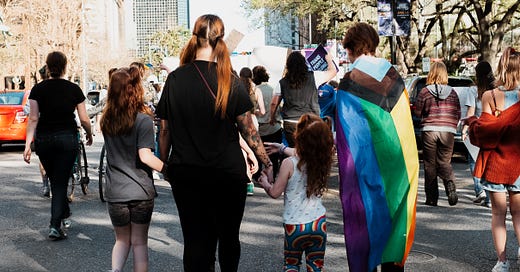Recently, I’ve watched the children of two sets of friends come out as trans and nonbinary. My friends have been overwhelmingly supportive and, from an outsider’s perspective, have done a wonderful job of parenting through such tumultuous times in their kids’ lives.
As good parents, we accept our children for who they are and who they want to be. We do our best to arm them with the necessary tools to express what they want out of life and the necessary tools to figure out how to achieve those ends. We use the tools we have to ensure they know that we love and support them ceaselessly and without condition.
But as I listened to my friends recount their stories of their children coming out as trans and nonbinary, I wondered, are we asking the parents how they’re doing? Are we giving them the love and support they need to give their children the love and support they need?
Because as young men and women coming out trans and non-binary becomes more and more common (which is a most excellent thing), this is something we’re all likely going to have to contest with at some point or another.
And while the focus is often trained on those young people and their transitions (rightly so), we need to remember to check in on their parents, who are dealing with their own sea change, who are watching the little boys and little girls they’ve raised become something else entirely; something those kids feel more comfortable as, a skin more natural in, but alas, something different than what they’ve always been.
The one thing that really struck me in both of these instances, likely because it was one of the biggest things that was hanging both of these parents up, was the idea of the dead name. That is, the name a person was given by their parents and one they’re choosing to transition away from. If the violence inherent in the idea of a dead name is unsettling to me, I can’t imagine the emotions it elicits in my friends.
As expectant parents, all you can control is the name, so almost everything seems to surround that as you and your partner nest and ready your homes and lives for the everything-changing addition of a child. Pillows, blankets, books, signs; everything has your kid’s name on it. So many gifts people give you are embroidered or emblazoned with that name. Get to pre-school and kindergarten and beyond, and every piece of art, every piece of paper, every scrap that kid has touched with a marker has their name on it. You scrawl that name in every backpack, on every lunchbox. You say that name millions of times over. And then a million times more. It becomes, in a way, an extension of you. So, really, we need to recognize the dead name as something for parents to grieve. And just as with any other grieving process, we need to give them the space, time, and support to grieve that.
Aside: To be abundantly clear, I’m not suggesting anyone move away from the idea of a dead name. Why? Because it’s not my fucking place to say or suggest anything. As a cisgendered guy, I don’t get a say in they way people in these positions choose to pursue their truths and their happiness. I can only do my best to understand and embrace them and their feelings.
As I see my friends go through these changes, I can’t help but to think how I would react if our son or daughter came to Emily and me, telling us the person we always thought they were is not the person they are; telling me that this element of themselves, this element that we so thoughtfully and lovingly bestowed them, would be better off dead. I’d like to think that if either of my children were to make such a drastic alteration in their lives, I would welcome them wholeheartedly.
Actually, forget that “I’d like to think” that. I know I would welcome them wholeheartedly. Because I know the kind of person that I am and I know the kind of love I have for my children.
Like my friends’, mine is a love that is unshakable.
What I don’t know is how I would react inside if I were ever faced with my son or daughter telling me they want that part of themselves to be considered dead. I don’t know because I’ve never had to confront that.
And neither have my friends. And neither have the parents of so many nonbinary or trans children. Which is why, even though most of our focus should be on the children, on making sure they know they’re loved and welcomed no matter what, we should always be checking in on their parents, on our friends, making sure they’re okay, even if it seems like they’re handling everything perfectly.



